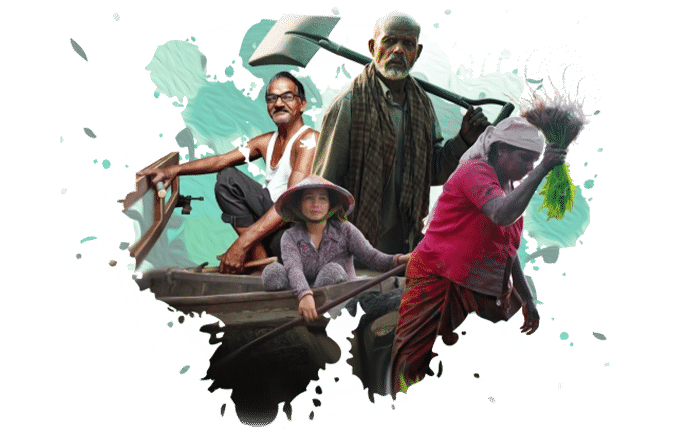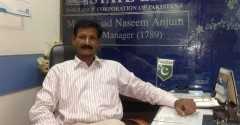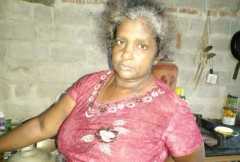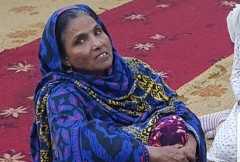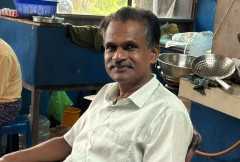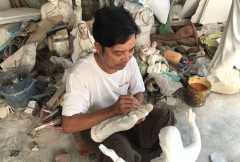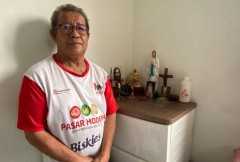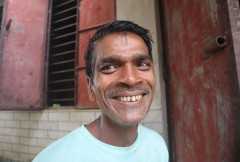Tribal man’s Catholic faith helps him lead dignified life
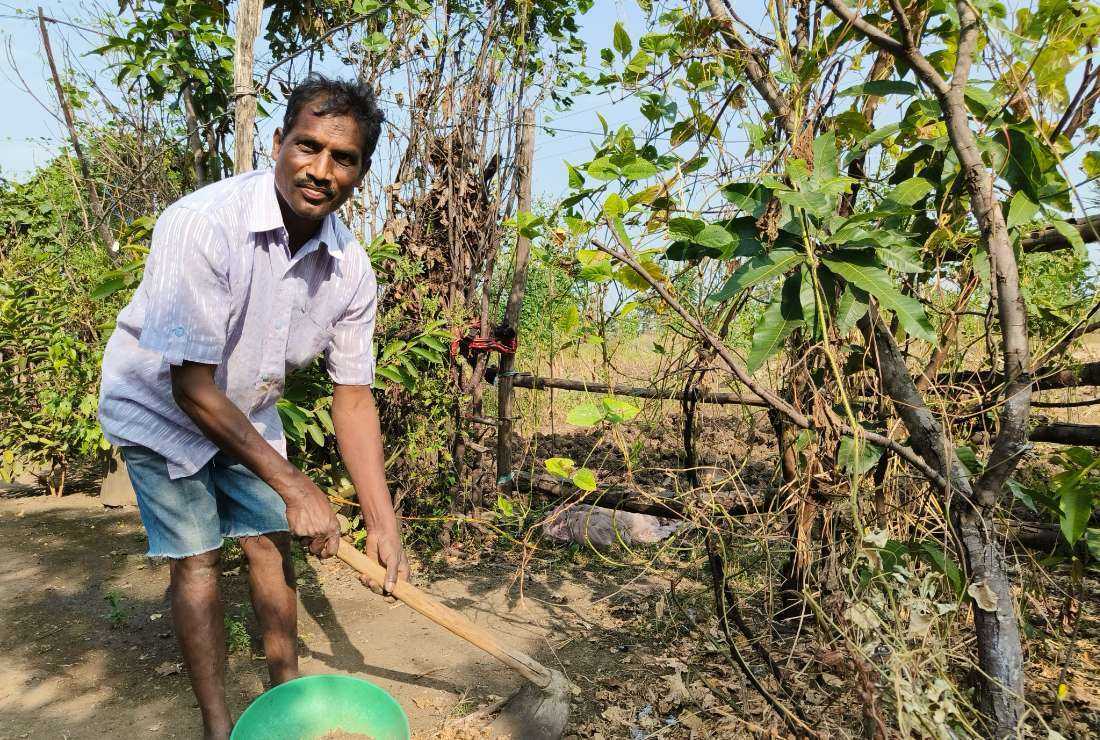
Ratan Singh Masram is seen working in his garden at his home in Dindori district, Madhya Pradesh, India in November 2023. (Photo: Saji Thomas / UCA News)
Ratan Singh Masram does not remember seeing his father, who abandoned his mother a few months after he was born. His mother left him in the care of her parents.
Both mother and father remarried and “practically forgot about me,” he says.Masram, a Gond tribal Catholic from central India, works hard as a day laborer to be a good father to his two children.
“Although I grew up almost like an orphan, my Catholic faith has helped me lead a decent life and bring up a Catholic family,” the 48-year-old says.
No one in Masram’s family was literate. The Gonds, a group of indigenous people in central and south-central India, did not send their children to school until recently.
“They also did not allow me to go to school,” he recalls.
As a child, he remembers working hard under the scorching sun in the fields, helping his grandparents cultivate rice, millet and oil seeds, besides grazing cattle and performing other daily chores like fetching water and firewood.
“God protected me. My life shows his plan,” says Masram who lives in a village in Dindori district of Madhya Pradesh state.
Masram is seen with his wife Chaity Bai in front of their still-under-construction house in Junwani parish in Jabalpur diocese located in Madhya Pradesh, India, in November 2023. (Photo: Saji Thomas / UCA News)
Becoming a Christian
As a teenager, he was forced to move out of his grandparents' home in search of work.
In nearby villages where he found work, Masram often spotted “some educated and well-behaved” people who wore “clean dresses.”
They regularly visited local people and took an interest in solving their problems.
He soon gathered they were Catholic priests and nuns from Jabalpur diocese.
“I wanted to be like them. But being illiterate, I knew very well that I could not become like them,” he recalled.
Despite the fact that nobody in his family even knew about Christianity, he made up his mind to become a Christian.
He was told by an acquaintance to meet the priest in nearby Junwani parish.
“The priest told me to learn more about Christianity before becoming one,” Masram said.
Though unable to read, he was determined enough to learn by heart the basic catechism.
A catechist would read out the texts to Masram and clear any doubts he had. He also memorized prayers and started attending Masses.
A few years later, he was baptized.
At the age of 18, Masram married a Catholic woman named Chaity who was three years younger than him. This was in keeping with their tribe’s customs and practices at the time.
However, he has ensured his children do not marry young.
A year ago he married off his daughter Rajkumari at the age of 28.
Now Masram is looking for a suitable partner for his 27-year-old son Suresh Kumar.
“As I could not study I made it a point to first provide a good education for my children,” he says.
Masram feels proud that his daughter holds a postgraduate degree while his son is a graduate and has completed a diploma course for an electrician.
Trusting in God’s plan
The Catholic missionaries supported the education of his children, but they were unable to find jobs matching their qualifications.
“God may have different plans for my children. I continue to pray for their bright future,” Masram says.
His family still depends on his meager income as a daily wage earner to survive.
The Indian government’s 100-days-a-year work guarantee scheme for poor people in rural areas fetches him 200 rupees (US$2.5) a day. On other days, he finds occasional work which pays him 150 rupees a day.
Despite his meager earnings, Sundays are set apart for rest and worship.
“We still survive happily with the small sums I earn,” he says.
His son recently started taking odd jobs to supplement his income.
“Many a time, we only have roti [flattened bread made of wheat flour] with salt, because I cannot afford to buy vegetables, meat or anything else to go with it,” Masram says.
“The only sumptuous meals we have are during feast days like Christmas or social functions like marriage,” he added.
But he has no complaints.
“I could not have educated my children without the Church’s help at a time when I was struggling to feed the family,” Masram says.

Chaity Bai is seen in front of her house cleaning rice for the day's cooking in November 2023. (Photo: Saji Thomas / UCA News)
The strong family prayer
Not many in Masram’s town can boast a concrete-roofed house. Something he is very proud of.
His small savings and help from the Christian community and missionaries made it possible for him to begin building the four-room house last year, just before his daughter’s marriage.
“But it is still not complete. We need to spend more money to give it the finishing touches,” he says.
Masram did not get a share of his father's property because he was abandoned. However, with rare determination, he has managed to purchase some 1.2 hectares (3 acres) of farmland.
“It's not cultivable now as there is a water crisis in our area,” he laments.
Masram and his family continue to pray for their modest needs.
“The family prayer is our strongest force that has ensured we remain happy together,” he says.
The family of four recites the rosary daily and the children read from the Bible. They also sing traditional Christian devotional songs to conclude the evening prayer.
“Nobody in our family misses Sunday Mass as it helps to keep our faith alive,” Masram’s son says.
Suresh Kumar believes the Catholic faith has helped them sail through all the difficulties of life such as poverty, sickness and mental tensions.
“My mother wants to be present in Church at least 10 minutes ahead of service on Sundays and feast days. She leaves home alone in case we are late,” he adds.
Dignifying faith
Masram quit his drinking habit, which is common among tribal people, and also keeps away from smoking or chewing tobacco.
“I realized that Jesus does not like it. And ever since I started to pray to Jesus, even before becoming a Christian, I’ve found solace and comfort. He is someone who is always with me,” he says.
And yet, Masram regrets that he cannot read the teachings of Christ and the saints, for a better understanding.
He also cannot keep himself abreast of the latest news about the Catholic Church and its leaders.
Masram does not know even the name of his bishop but is aware that he is based in Jabalpur.
“I felt so happy when the bishop allowed me to kiss his signet ring,” he says of a parish visit by Bishop Gerald Almeida.
Although the Catholic presence in the diocesan area dates back to 1840, Jabalpur became a prefecture apostolic only in 1932 and a diocese in 1954.
The Marsam family is considered a "well-to-do and educated" family among Gond people, who make up nearly 95 percent of the roughly 30,000 Catholics in the diocese.
This is no surprise because around 22 percent of the 72 million people in the central Indian state belong to various tribal communities.

From right to left, Ratan Singh Masram, Chaity Bai and their son Suresh Kumar are pictured in front of their under-construction house in Dindori district, Madhya Pradesh, India, in November 2023. (Photo: Saji Thomas / UCA News)
Inter-religious amity
Masram lives among members of the majority Hindu community.
Madhya Pradesh is considered a hotbed of anti-Christian violence perpetrated by hardline Hindu groups to counter alleged religious conversion activities of the Church.
But Masram and his family have faced no difficulties in practicing their Catholic faith.
“We've never faced any discrimination from anybody so far. We became Christians on our own without any force or allurement. And, no one opposed us,” he says.
Masram lives in his ancestral village in harmony with fellow indigenous people.
“We all gather together to celebrate Christmas and other religious festivals. Even non-Christians eagerly look forward to the parish carol singing choir visiting my home,” he adds.
The diocese remains focused “on educating the indigenous people and to bring them into the mainstream Indian society,” Bishop Almeida told UCA News.
Like it helped Masram make steady progress in life, the Church and its various institutions continue to provide subsidized education to over 100,000 students every year.
A large chunk of the beneficiaries are from indigenous communities belonging to different faith or belief systems.
“Education is the only way to bring real transformation in their lives,” the prelate asserts.



Publisher
UCA News



